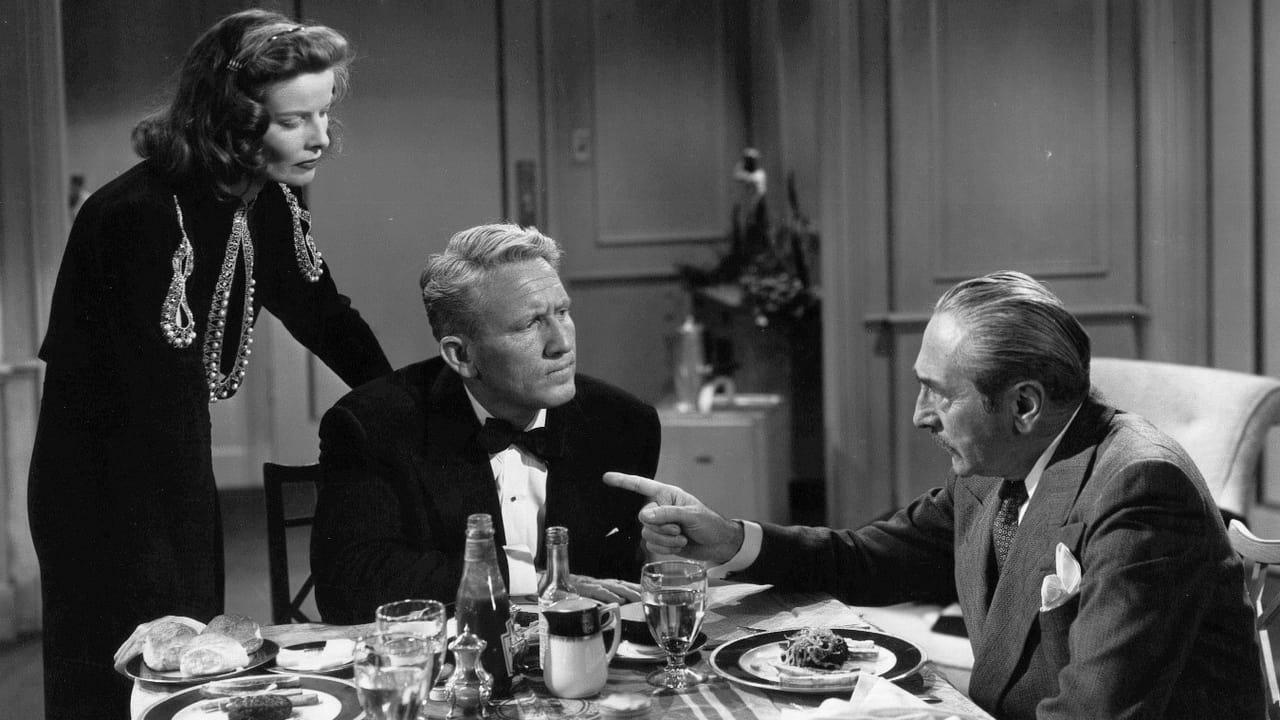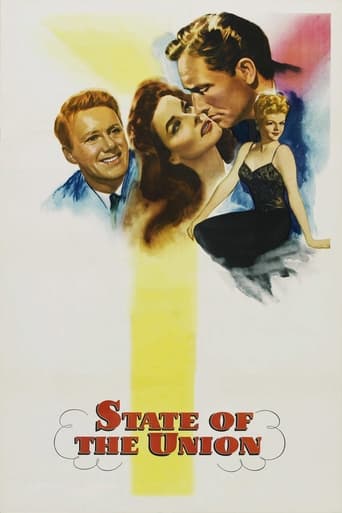

Sadly, politics haven't changed, and probably never will, in the intervening 61 years since this movie was made. As with most Capra movies, it's not hard to get the message, but that doesn't make it any less hard hitting. Also, as with most Capra movies, it allows the viewer to wonder "what if" if only for a couple of hours. All of the major actors are stellar, but then again, they were seldom anything but in most of their films. It was a little distracting to see Spencer Tracey looking down to apparently read some of his final speech, but the speech and the entire movie were very powerful. It should be required viewing for today's political science classes.
... View MorePolitics then and now, what's the difference? "People are beginning to think that there is no difference between the Republican and the Democratic party" Sounds familiar? Special interests groups, lobbyists, mercenaries and somewhere in the middle of it all Spencer Tracy and Katharine Hepburn, projecting the hopes of all well meaning Americans, or earthlings in general for that matter. The chemistry between Tracy and Hepburn is so all consuming that whatever we see them do or hear them say we believe, we believe totally. As if this was not enough, Adelph Menjou gives his character a truth that is as relevant and uncomfortable as it is entertaining. But the crowning jewel of this wonderful film is Angela Lansbury - she was barely 20 years old when she made this movie and look at her, just look at her. Not merely holding her own with seasoned stars like Tracy and Hepburn but at times, overshadowing them. This is considered a minor Capra, I just say, you must be kidding.
... View MoreAlthough the political references are dated (Hoover, Harding,FDR, Truman) this film is wonderful. If you just cued to the speeches about cutting taxes and the American Dream it could be an editorial out of the magazine The Nation. In 1948 Hollywood was able to take incredible actors and actresses, record more words in five minutes than a movie today speaks in an hour, and still appeal to the "common folk" politically. Hokey but sophisticated, patriotic but cynical, State of the Union grapples with the corruption behind political machines. Its main weakness is the presentation of a powerful woman as someone who belongs "in a kennel" and the good woman the mother with two kids who kneels and sews a loose thread in her husband's suit (even though she knows he is cheating on her). Hepburn manages to be powerful, strong willed, but a typical mid-century hausfrau-there for her man. You may not agree with its presentation of women, but its politics are as astute anything you will read on a blog today.
... View MoreWhat Frank Capra did here was take a stage script, assemble the finest actors available, add a couple of scenes not seen onstage, and deliver a thoroughly entertaining still politically-relevant showcase.Tracy and Hepburn, as always, are solid and fascinating. Did anybody ever "catch" Spencer Tracy "acting?" That's the advice Burt Reynolds said Spence gave him on acting: "Don't let 'em catch you at it." There, in seven words, is the most profound advice ever given to actors. And Tracy absolutely embodied it throughout his long career.The single "stagiest" moment in "State of the Union" is Tracy's long speech to the old man at the wrought-iron fence in front of the rear-projection White House. An utterly impossible catalogue of history's "heroes," fictional and non-, who "spiritually" inhabit the White House -- "that noble edifice." The speech is a mouthful and pedantic to boot. But somehow, Tracy manages to pull it off.Hepburn, as always, is thoroughly captivating, both as a performer and in the character. Yet, as always, there are moments you "catch" her acting. Say, in her "drunken" transition from laughter to tears in the broadcast sequence that concludes "State of the Union." Hepburn's best and bravest work, perhaps, was in "Long Day's Journey Into Night." Her silliest and phoniest? "Bringing Up Baby." (Yet even there, she's still delightful!) Who else in "State of the Union" do you catch "acting?" Van Johnson. Margaret Hamilton. Taken as "comic relief," however, they're fine -- in a stagy sort of overplayed way.Certainly not Angela Lansbury or Adolphe Menjou. Both fine actors who long understood the different demands for stage and film. And delivered.What's alarming is the shoddy "continuity" early on. Perhaps for budgetary reasons, Capra couldn't reshoot the initial scene in Kay Thorndyke's (Angela Lansbury's) office. Or perhaps the continuity girl was home sick that day. Or the actors' couldn't remember their positions from setup to setup. Or Capra didn't care.Whatever. Virtually every cut in that office scene finds the participants (except Tracy, tellingly) in significantly different postures than from a split-second ago. Lansbury leans back in her chair behind her desk. CUT: she's sitting forward, leaning over papers on her desk. Etc., etc. It's jarring and sloppy.The highlight, among many highlights, of "State of the Union" is the near-end entry of Judge and Lulubelle Alexander at the home-broadcast of Tracy's pre-election address to the nation. Played by Raymond Turner and Maidel Walburn. You don't catch them acting, either. Maidel Walburn is particularly impressive as the jolly matronly alcoholic wife of a Louisiana politician. Walburn is the very definition of "supporting actor" here. She and Hepburn play off each other with seeming spontaneity and obvious great humor.Amazingly, one knows more about "Lulubelle" from this brief sequence -- her background, her humor as self-protection, her shallowness, her heartbreak, her essential goodness, her need for alcohol -- than one knows about the backstories of either Spencer Tracy's or Katharine Hepburn's characters. And it's not in the writing. It's in Walburn's effortless performance.Then "State of the Union" devolves into a Capra-esquire feel-good ending featuring a crowd of extras singing "for-he's-a-jolly-good-fellow" bromides as the wife and children huddle for a closeup. Better done in "It's a Wonderful Life" because Christmas was thrown into the mix. But still effective. In a cheaply manipulative kind of way.Great scenes. Wonderful performers. A rare gem.And you still can't catch Spencer Tracy acting.
... View More